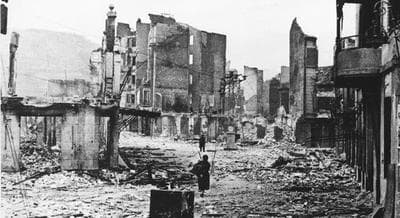Advertisement
The Bomb: No Easy Answers, So Let's Keep Asking The Question
So, should we bomb Syria?
After Afghanistan, after the drones in Pakistan, after Libya, after Iraq, after ... after what?
I’ve lived through so many American bombings, they glob together and become indistinct. We were still bombing Korea when I was born, and I came of age as we bombed Vietnam, Cambodia, Laos. I witnessed the Cuban Missile crisis and the armament frenzy of the Cold War when nuclear bombs held us hostage to extinction. We were, as the talking heads liked to say, part of “Mutually Assured Destruction” — an idea bizarre enough that even its acronym noted its insanity; an idea, we must remember, that is still quietly in play.
The word “bomb” is so bland, it’s easy to gloss over the ruin and blood of those who bear its impact.
The word “bomb” is so bland, it’s easy to gloss over the ruin and blood of those who bear its impact. Few horrors equal it. And, in truth, the history of bombing is arguably as atrocious as the evil it seeks to halt. Don’t take my word, but go look at the way the Italians practiced on the Libyans, the British on the Abyssinians, and how the Nazis readied themselves to conquer the world by raining bombs upon the Spanish during the Spanish Civil War. (Picasso gave us “Guernica” to help us recollect.) Consider how the United States ended the Second “good” World War by dropping more tons of ordnance than the most sympathetic historians can possibly justify. (Perhaps it’s time to collectively revisit Kurt Vonnegut’s autobiographical novel “Slaughterhouse-Five,” in which he recounted the inferno created by the Allied fire-bombing that destroyed Dresden. He was a prisoner of war there, and barely lived to tell the tale.)

Still, when we see people being exterminated by their own leaders, we know impassivity is not a righteous path. What if, to raise a famous example, Roosevelt had immediately bombed the rails to Auschwitz and Dachau?
Or, changing perspectives for a moment, what if a powerful and enlightened nation had bombed us as we perpetrated atrocities against our own? Bombed Andrew Jackson before he slaughtered Creek Indians at Horseshoe Bend in 1814? Bombed the great slave markets in Charleston, and all the builders of the ships that carried and killed millions of African slaves during the middle passage? Would we have saved countless lives, and been spared living with the legacies of a genocide and a terrible civil war?
Perhaps life only offers us the choice of bomb or be bombed.
But, who am I to grouse against our actions? I have lived 61-years without having to think for a moment about my country being occupied, my children slaughtered. Talk about privilege. Perhaps life only offers us the choice of bomb or be bombed. Perhaps gratitude is the only proper course — even as I have carried so many signs and marched so many times to attempt to halt awful wars.
And I am deeply grateful for my safety; for having been spared the Gulag under Stalin, or re-education under Mao. Yet, my heart aches, my mind rebels, and my soul feels weary, and I have to ask, is violence the only possible collective way? Sword against sword — from the dawn of time to its demise? Is diplomacy so ineffectual? Mass sentiment so feeble? Our human nature so hard-wired? Will we never stop dominating and killing?
I have no answer, but let us not forsake the dignity of the question.
This program aired on September 9, 2013. The audio for this program is not available.